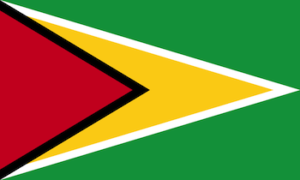
Guyana Flag
*On this date in 1966, Guyana gained independence from Britain.
Located in Northeastern South America, Guyana's recorded history began in 1499, when Alonso de Ojeda's first expedition arrived from Spain at the Essequibo River, having traveled through the Middle Passage. The Guyana story has been shaped by the diverse national and ethnic groups, as well as the colonial policies of the Spanish, French, Dutch, and British.
The African slave rebellions in 1763 and 1823 were formative moments in the nation's history. African slaves were transported to Guyana; in contrast, East Indians came as indentured laborers. Guyana's story is one of struggle to free itself from colonial rule and the lingering effects of colonialism.
The Dutch were the first Europeans to settle in modern-day Guyana. In 1616, the Dutch established the first European settlement, a trading post twenty-five kilometers upstream from the mouth of the Essequibo River. Other settlements followed, usually a few kilometers inland on the larger rivers. The initial purpose of the Dutch settlements was to trade with the indigenous people. The Dutch soon changed their aim to acquiring territory as other European powers gained colonies elsewhere in the Caribbean. Although Guyana was claimed by the Spanish, who sent periodic patrols through the region, the Dutch gained control over the region early in the 17th century. Dutch sovereignty was officially recognized with the signing of the Treaty of Munster in 1648.
The French Revolution and the subsequent Napoleonic Wars catalyzed a formal British takeover. In 1795, the French occupied the Netherlands. The British declared war on France and, in 1796, launched an expeditionary force from Barbados to occupy the Dutch colonies in the Caribbean. The British takeover was bloodless, and the local Dutch administration of the colony was left relatively uninterrupted under the constitution provided by the Concept Plan of Redress. Berbice and the United Colony of Demerara and Essequibo were under British control from 1796 to 1802. Using the Treaty of Amiens, both were returned to Dutch control.
Peace was short-lived, however. War between Britain and France resumed, and in 1803, British troops seized the United Colony and Berbice once more. At the London Convention of 1814, both colonies were formally ceded to Britain. In 1831, Berbice, the United Colony of Demerara, and Essequibo were unified as British Guiana. The colony would remain under British control until independence in 1966.